Scalper1 News
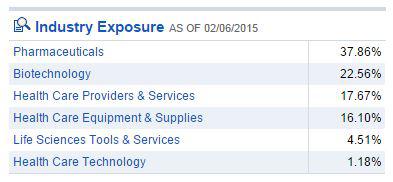

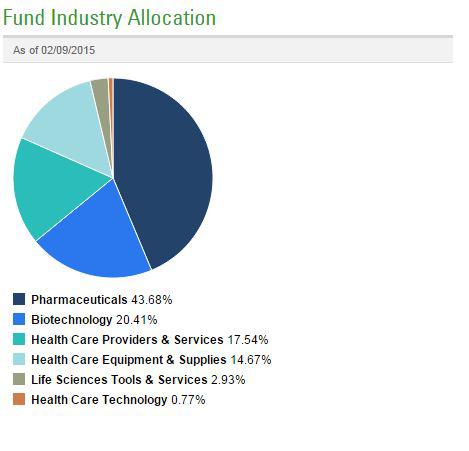
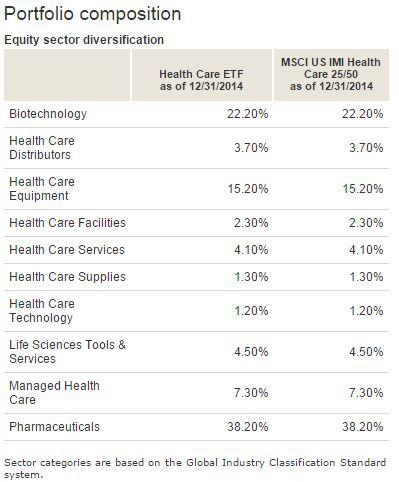
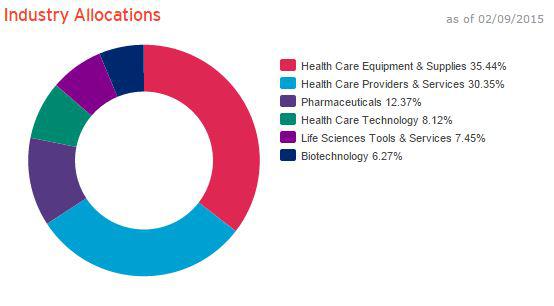
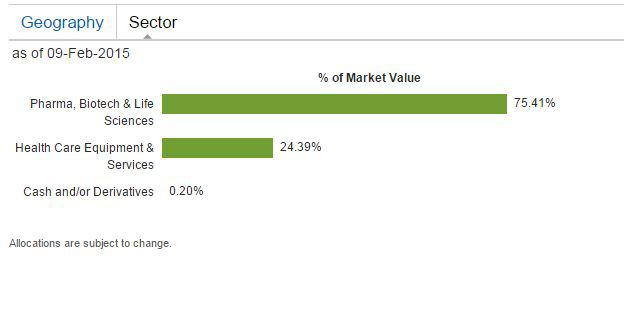
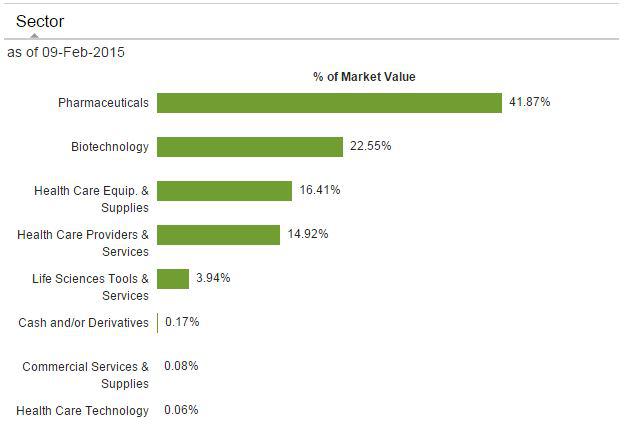 Summary According to the World Health Organization, global health related expenditures exceed $6 trillion annually. American population aged 65+, which is a driver of health care spending, is expected to grow by nearly 20,000,000 in the next decade according to U.S. Census Bureau. This list highlights key considerations for those who wish to have exposure to the health care industry ranging from domestic to global, large-cap to small-cap. I made the mistake of signing up for a high deductible health plan when I changed jobs this summer. I’m young and relatively healthy. My wife is young and relatively healthy. Even my daughter (who was born January of last year) is young and relatively healthy. The premiums were cheap, wellness visits and routine check-ups were covered, I got a cool $1,000 to shield me from out-of-pocket costs, and none of us visit the doctor very often. It seemed like the right thing to do. And it was. Until it wasn’t. The three of us had a few “unexpected” minor health urgencies that required, among other things, a couple of visits to rural hospitals, an urgent care stop, and some stupidly expensive but needed basic medical concoctions. When it was all said and done, I paid roughly $5,000 in premiums for the privileged of being able to pay for $5,000 in out-of-pocket costs, which was essentially the entirety of our medical bills. Let me say that everyone has since recovered, we are so blessed that our medical problems were anything but, and their are people either without insurance, or with far more serious medical issues, that spend tens if not hundreds of thousands of dollars more for care than we did. But it still hurt. $10,000 is $10,000 is $10,000. As I sat in the emergency room for the final time of 2014, staring at expensive looking equipment, refusing Tylenol (since I knew it would show up on our chart and be billed accordingly), I thought – I need to get in on this racket. Whether you are as healthy as an ox, or as sick as a dog, when you decide to invest in the healthcare sector, you have several options: Invest in individual stocks of companies that provide healthcare services (Johnson & Johnson (NYSE: JNJ ); Pfizer (NYSE: PFE ); Medtronic (NYSE: MDT ) and so on) Invest in ETFs covering the entire healthcare industry (more on that below) Invest in those that serve the healthcare industry (think hospital REITs like HCP ) Become a healthcare professional (not in the cards for this guy, even with the absurd rise of so called ” second chance” med-schools ) Since I like diversification as much as like good health, and I believe an investment in the healthcare industry should be an investment in the healthcare industry, I opted for option b), investing in healthcare ETFs. Yahoo lists no less than two dozen health-themed ETFs (complete list at end of article), but to keep it simple, I present seven ETFs for further consideration. Profiling the contenders – Unless otherwise noted, information is as of close 2/10/15 (Source: fidelity.com etf screener, all objectives are as listed on the respective funds’ websites without modification). Fidelity MSCI Health Care Index ETF (NYSEARCA: FHLC ) Market price – $33.81 1 year* beta at 1/31/15 (Fidelity) – .84 Expense ratio – .12% Total holdings – 320 Average volume – 198,495 Yield – 1.01% Price/earnings – 25.44 Price/Cash flow – 16.82 Objective – “Seeks to provide investment returns that correspond, before fees and expenses, generally to the performance of the MSCI USA IMI Health Care Index. Investing at least 80% of assets in securities included in the fund’s underlying index. The fund’s underlying index is the MSCI USA IMI Health Care Index, which represents the performance of the health care sector in the U.S. equity market.” Courtesy of Fidelity Top Ten Holdings by Weight (as of 2/6/15) Johnson & Johnson – 8.88% Pfizer – 6.55% Merck & Co (NYSE: MRK ) – 5.28% Gilead Sciences (NASDAQ: GILD ) – 4.59% Amgen Inc (NASDAQ: AMGN ) – 3.58% Medtronic PLC – 3.28% UnitedHealth Group (NYSE: UNH ) – 3.26% Bristol-Myers Squibb Co (NYSE: BMY ) – 3.08% Biogen Idec (NASDAQ: BIIB ) – 2.96% Celgene Corp (NASDAQ: CELG ) – 2.96% *Fund inception 10/21/13 Investment thoughts – The Fidelity fund’s volume of holdings (the highest among all funds profiled) gives it the highest mark for diversification. It also is tied for lowest expense ratio with Vanguard and when held in a Fidelity account trades commission free. Johnson and Johnson, its largest holding is trading essentially in the middle of its 52 week range (90.66 – 109.49) as of 2/11/15 while Pfizer, its second largest holding hit an intra-day 52 week high . Buy this fund if you don’t mind giving serious weight to mega-cap companies. First Trust Health Care AlphdaDEX ETF (NYSEARCA: FXH ) Market price – $61.96 3/5 year beta at 1/30/15 (Yahoo) – .76/.69 Expense ratio – .66% Total holdings – 75 Average volume – 419,984 Yield – n/a Price/earnings – 27.81 Price/Cash flow – 15.52 Objective – “The First Trust Health Care AlphaDEX® Fund is an exchange-traded fund. The investment objective of the Fund is to seek investment results that correspond generally to the price and yield, before fees and expenses, of an equity index called the StrataQuant® Health Care Index. The StrataQuant® Health Care Index is an “enhanced” index developed, maintained and sponsored by the NYSE Group, Inc. or its affiliates (“NYSE”) which employs the AlphaDEX® stock selection methodology to select stocks from the Russell 1000® Index. The NYSE constructs the StrataQuant® Health Care Index by ranking the stocks which are members of the Russell 1000® Index on growth factors including three, six and 12-month price appreciation, sales to price and one year sales growth, and, separately, on value factors including book value to price, cash flow to price and return on assets.” (click to enlarge) Courtesy of First Trust Top Ten Holdings by Weight (as of 2/6/15) Centene Corp (NYSE: CNC ) – 2.45% AmerisourceBergen Corp (NYSE: ABC ) – 2.38% McKesson Corp (NYSE: MCK ) – 2.38% Aetna (NYSE: AET ) – 2.36% Allergan (NYSE: AGN ) – 2.35% Patterson Companies (NASDAQ: PDCO ) – 2.33% Edwards Lifesciences Corp (NYSE: EW ) – 2.31% BioMarin Pharmaceutical (BM8) – 2.30% Incyte Corp (NASDAQ: INCY ) – 2.28% Henry Schein (HS2) – 2.27% Investment thoughts – The First Trust Health Care ETF’s “enhanced” indexing methodology allows it to represent large and small cap companies that offer attractive buy signals based on quantitative valuation metrics including price multiples and return ratios. Buy this ETF if you don’t mind paying (relatively) higher fees in order to own a fund that doesn’t track a single index but instead seeks to include opportunistic holdings based on price and performance. Also, no stock makes up more than 3% of the fund’s NAV, so don’t expect big swings in any given stock to materially impact the fund’s overall performance. Health Care Select Sector SPDR ETF (NYSEARCA: XLV ) Market price – $70.12 3/5 year beta at 1/30/15 (Yahoo) – .67/.59 Expense ratio – .15% Total holdings – 57 Average volume – 10,235,200 Yield – 1.33% Price/earnings – 24.84 Price/Cash flow – 16.88 Objective – “The Health Care Select Sector SPDR® Fund seeks to provide investment results that, before expenses, correspond generally to the price and yield performance of the S&P® Health Care Select Sector Index.” Courtesy of State Street Top Ten Holdings by Weight (as of 2/5/15) Johnson & Johnson – 10.62% Pfizer – 7.70% Merck & Co – 6.25% Gilead Sciences – 5.58% Amgen Inc – 4.32% Medtronic PLC – 3.98% UnitedHealth Group – 3.90% Bristol-Myers Squibb Co – 3.72% Biogen Idec – 3.59% Celgene Corp – 3.55% Investment thoughts – The SPDR ETF, like Vanguard, Fidelity and iShares has significant weight in a single stock (Johnson & Johnson), but only its top four holdings make up 5% or more of NAV on an individual basis. This ETF is by far the most popular health care ETF, with average volume over 10 times its next closest competitor. The SPDR fund is also near the cheapest based on its constituents price/earnings multiple. SPDR is also one of two funds profiled with over 40% exposure to pharmaceuticals. Vanguard Health Care ETF (NYSEARCA: VHT ) Market price – $129.12 3/5 year beta at 1/30/15 (Yahoo) – .68/.64 Expense ratio – .12% Total holdings – 319 Average volume – 363,562 Yield – 1.01% Price/earnings – 25.84 Price/Cash flow – 16.84 Objective – “The Health Care Select Sector SPDR® Fund seeks to provide investment results that, before expenses, correspond generally to the price and yield performance of the S&P® Health Care Select Sector Index.” Courtesy of Vanguard Top Ten Holdings by Weight (as of 12/31/14) Johnson & Johnson – 9.40% Pfizer – 6.30% Merck & Co – 5.20% Gilead Sciences – 4.50% Amgen Inc – 3.80% AbbVie (NYSE: ABBV ) – 3.30% UnitedHealth Group – 3.90% Bristol-Myers Squibb Co – 3.10% Celgene Corp – 2.80% Biogen Idec – 2.50% Investment thoughts – The Vanguard fund is tied with Fidelity for lowest expense ratio, and when purchased as Admirals shares, is the cheapest. Also like Fidelity, this fund has over 300 individual holdings giving investors broad exposure to a large number of health care related companies. PowerShares S&P SmallCap Health Care Portfolio ETF (NASDAQ: PSCH ) Market price – $62.97 3 year** beta at 1/30/15 (Yahoo) – .72/n/a Expense ratio – .29% Total holdings – 71 Average volume – 10,903 Yield – n/a Price/earnings – 32.26 Price/Cash flow – 15.61 Objective – “The PowerShares S&P SmallCap Health Care Portfolio ((Fund)) is based on the S&P SmallCap 600® Capped Health Care Index ((Index)). The Fund will normally invest at least 90% of its total assets in common stocks that comprise the Index. The Index is designed to measure the overall performance of common stocks in the health care sector. Included are healthcare companies principally engaged in the business of providing healthcare-related products and services, including biotechnology, pharmaceuticals, medical technology and supplies, and facilities.” Courtesy of Invesco Top Ten Holdings by Weight (as of 2/6/15) West Pharmaceutical Services (NYSE: WST ) – 4.40% PAREXEL International (NASDAQ: PRXL ) – 4.15% Amsurg Corp (NASDAQ: AMSG ) – 3.30% Impax Laboratories (NASDAQ: IPXL ) – 3.15% MWI Veterinary Supply (NASDAQ: MWIV ) – 2.98% Medidata Solutions (NASDAQ: MDSO ) – 2.97% Haemonetics Corp (NYSE: HAE ) – 2.68% NuVasive Inc (NASDAQ: NUVA ) – 2.67% ABIOMED Inc (NASDAQ: ABMD ) – 2.59% Prestige Brands Holdings (NYSE: PBH ) – 2.51% **Fund inception 04/07/10 Investment thoughts – This small cap fund’s top ten holdings contain none of the same top ten holdings as all other funds profiled and could be a compliment to any other fund on the list. Beware that it is the most thinly traded of all funds on the list and could result in undesirable bid-ask spreads when entering or exiting a position. iShares Global Healthcare ETF (NYSEARCA: IXJ ) Market price – $103.08 3/5 year beta at 1/30/15 (Yahoo) – .75/.62 Expense ratio – .48% Total holdings – 95 Average volume – 123,427 Yield – 1.34% Price/earnings – 24.76 Price/Cash flow – 16.47 Objective – “The iShares Global Healthcare ETF seeks to track the investment results of an index composed of global equities in the healthcare sector. IXJ offers exposure to pharmaceutical, biotechnology, and medical device companies from around the world.” Courtesy of BlackRock Top Ten Holdings by Weight (as of 2/5/15) Johnson & Johnson – 6.99% Novartis AG ( NOVN ) – 6.42% Pfizer – 5.07% Roche Holding (NYSE: ROG ) – 4.63% Merck & Co – 4.11% Gilead Sciences – 3.67% Bayer AG ( OTCPK:BAYN ) – 2.94% Amgen – 2.84% Sanofi SA (NYSE: SAN ) – 2.83% Glaxosmithkline (NYSE: GSK ) – 2.73% Investment thoughts – This iShares ETF trades at the lowest price/earnings multiple and also sports the highest TTM yield of all funds profiled. While its called a global fund, be aware that many of its top holdings are also found in U.S. focused funds including Johnson & Johnson, Pfizer, Merk, and Gilead. iShares U.S. Healthcare ETF (NYSEARCA: IYH ) Market price – $148.04 3/5 year beta at 1/30/15 (Yahoo) – .68/.62 Expense ratio – .43% Total holdings – 112 Average volume – 285,592 Yield – 1.03% Price/earnings – 24.91 Price/Cash flow – 16.73 Objective – “The iShares U.S. Healthcare ETF seeks to track the investment results of an index composed of U.S. equities in the healthcare sector. IYH offers exposure to U.S. health care equipment and services, pharmaceuticals, and biotechnology companies.” Courtesy of Blackrock Top Ten Holdings by Weight (as of 2/5/15) Johnson & Johnson – 9.97% Pfizer – 7.23% Merck & Co – 5.87% Gilead Sciences – 5.24% Amgen Inc – 4.06% Medtronic – 3.72% Unitedhealth Group – 3.63% Bristol Myers Squibb – 3.47% Celgene Corp – 3.33% Biogen IDEC – 3.30% Investment thoughts – Another heavy on pharmaceuticals fund, the iShares U.S. fund sticks out as among the weaker candidates. It has limited exposure to health care technology, expenses nearly four times its cost leading competitors (Vanguard and Fidelity) and offers an unimpressive yield that is nearly half of the S&P 500. Closing thoughts: Do not buy more than one of these funds (unless one is the small cap). Reason: you will just end up with varying degrees of the same few large names. Names like Johnson & Johnson, Merck, Gilead and Amgen pepper the top 10 lists of most of these funds. Don’t expect any single stock’s outperformance to move the ETF’s price mountains. No fund has more than a 10% stake in any given company. Monitor your investments and rebalance as necessary. The composition and risk profile of these funds can and does change frequently. ETF NAME TICKER CATEGORY FUND FAMILY 1-YR RETURN 3-YR RETURN 5-YR RETURN RBS Global Big Pharma ETN DRGS Health Royal Bank of Scotland NV 25.42% 26.30% 0.00% SPDR® S&P Health Care Equipment ETF XHE Health SPDR State Street Global Advisors 14.26% 21.81% 0.00% Health Care Select Sector SPDR® ETF XLV Health SPDR State Street Global Advisors 25.14% 27.59% 19.18% iShares Nasdaq Biotechnology IBB Health iShares 33.83% 43.05% 30.36% Market Vectors® Pharmaceutical ETF PPH Health Market Vectors 23.19% 23.90% 0.00% iShares U.S. Pharmaceuticals IHE Health iShares 29.89% 27.45% 23.05% SPDR® S&P International HealthC Sect ETF IRY Health SPDR State Street Global Advisors 6.22% 17.05% 12.18% PowerShares Dynamic Pharmaceuticals ETF PJP Health PowerShares 28.13% 35.42% 30.63% First Trust Health Care AlphaDEX® ETF FXH Health First Trust 25.42% 30.71% 22.97% iShares U.S. Healthcare Providers IHF Health iShares 27.19% 26.81% 19.95% SPDR® S&P Pharmaceuticals ETF XPH Health SPDR State Street Global Advisors 29.45% 32.16% 26.09% Vanguard Health Care ETF VHT Health Vanguard 25.47% 28.67% 20.02% Guggenheim S&P 500® Eq Weight HC ETF RYH Health Guggenheim Investments 29.73% 30.12% 21.01% Fidelity® MSCI Health Care ETF FHLC Health Fidelity Investments 25.06% 0.00% 0.00% iShares U.S. Medical Devices IHI Health iShares 22.72% 25.09% 16.87% iShares U.S. Healthcare IYH Health iShares 25.14% 28.02% 19.46% iShares Global Healthcare IXJ Health iShares 17.29% 23.30% 16.33% PowerShares Dynamic Biotech & Genome ETF PBE Health PowerShares 36.34% 36.05% 24.79% PowerShares DWA Healthcare Momentum ETF PTH Health PowerShares 14.75% 24.28% 18.24% SPDR® S&P Biotech ETF XBI Health SPDR State Street Global Advisors 44.98% 41.86% 28.72% Market Vectors® Biotech ETF BBH Health Market Vectors 30.34% 47.02% 0.00% First Trust NYSE Arca Biotech ETF FBT Health First Trust 47.55% 46.21% 29.02% ARK Genomic Revolution Multi-Sector ETF ARKG Health ARK ETF Trust 0.00% 0.00% 0.00% PowerShares S&P SmallCap Health Care ETF PSCH Health PowerShares 11.13% 24.99% 0.00% ALPS Medical Breakthroughs ETF SBIO Health ALPS 0.00% 0.00% 0.00% Disclosure: The author has no positions in any stocks mentioned, and no plans to initiate any positions within the next 72 hours. (More…) The author wrote this article themselves, and it expresses their own opinions. The author is not receiving compensation for it (other than from Seeking Alpha). The author has no business relationship with any company whose stock is mentioned in this article. Scalper1 News
Summary According to the World Health Organization, global health related expenditures exceed $6 trillion annually. American population aged 65+, which is a driver of health care spending, is expected to grow by nearly 20,000,000 in the next decade according to U.S. Census Bureau. This list highlights key considerations for those who wish to have exposure to the health care industry ranging from domestic to global, large-cap to small-cap. I made the mistake of signing up for a high deductible health plan when I changed jobs this summer. I’m young and relatively healthy. My wife is young and relatively healthy. Even my daughter (who was born January of last year) is young and relatively healthy. The premiums were cheap, wellness visits and routine check-ups were covered, I got a cool $1,000 to shield me from out-of-pocket costs, and none of us visit the doctor very often. It seemed like the right thing to do. And it was. Until it wasn’t. The three of us had a few “unexpected” minor health urgencies that required, among other things, a couple of visits to rural hospitals, an urgent care stop, and some stupidly expensive but needed basic medical concoctions. When it was all said and done, I paid roughly $5,000 in premiums for the privileged of being able to pay for $5,000 in out-of-pocket costs, which was essentially the entirety of our medical bills. Let me say that everyone has since recovered, we are so blessed that our medical problems were anything but, and their are people either without insurance, or with far more serious medical issues, that spend tens if not hundreds of thousands of dollars more for care than we did. But it still hurt. $10,000 is $10,000 is $10,000. As I sat in the emergency room for the final time of 2014, staring at expensive looking equipment, refusing Tylenol (since I knew it would show up on our chart and be billed accordingly), I thought – I need to get in on this racket. Whether you are as healthy as an ox, or as sick as a dog, when you decide to invest in the healthcare sector, you have several options: Invest in individual stocks of companies that provide healthcare services (Johnson & Johnson (NYSE: JNJ ); Pfizer (NYSE: PFE ); Medtronic (NYSE: MDT ) and so on) Invest in ETFs covering the entire healthcare industry (more on that below) Invest in those that serve the healthcare industry (think hospital REITs like HCP ) Become a healthcare professional (not in the cards for this guy, even with the absurd rise of so called ” second chance” med-schools ) Since I like diversification as much as like good health, and I believe an investment in the healthcare industry should be an investment in the healthcare industry, I opted for option b), investing in healthcare ETFs. Yahoo lists no less than two dozen health-themed ETFs (complete list at end of article), but to keep it simple, I present seven ETFs for further consideration. Profiling the contenders – Unless otherwise noted, information is as of close 2/10/15 (Source: fidelity.com etf screener, all objectives are as listed on the respective funds’ websites without modification). Fidelity MSCI Health Care Index ETF (NYSEARCA: FHLC ) Market price – $33.81 1 year* beta at 1/31/15 (Fidelity) – .84 Expense ratio – .12% Total holdings – 320 Average volume – 198,495 Yield – 1.01% Price/earnings – 25.44 Price/Cash flow – 16.82 Objective – “Seeks to provide investment returns that correspond, before fees and expenses, generally to the performance of the MSCI USA IMI Health Care Index. Investing at least 80% of assets in securities included in the fund’s underlying index. The fund’s underlying index is the MSCI USA IMI Health Care Index, which represents the performance of the health care sector in the U.S. equity market.” Courtesy of Fidelity Top Ten Holdings by Weight (as of 2/6/15) Johnson & Johnson – 8.88% Pfizer – 6.55% Merck & Co (NYSE: MRK ) – 5.28% Gilead Sciences (NASDAQ: GILD ) – 4.59% Amgen Inc (NASDAQ: AMGN ) – 3.58% Medtronic PLC – 3.28% UnitedHealth Group (NYSE: UNH ) – 3.26% Bristol-Myers Squibb Co (NYSE: BMY ) – 3.08% Biogen Idec (NASDAQ: BIIB ) – 2.96% Celgene Corp (NASDAQ: CELG ) – 2.96% *Fund inception 10/21/13 Investment thoughts – The Fidelity fund’s volume of holdings (the highest among all funds profiled) gives it the highest mark for diversification. It also is tied for lowest expense ratio with Vanguard and when held in a Fidelity account trades commission free. Johnson and Johnson, its largest holding is trading essentially in the middle of its 52 week range (90.66 – 109.49) as of 2/11/15 while Pfizer, its second largest holding hit an intra-day 52 week high . Buy this fund if you don’t mind giving serious weight to mega-cap companies. First Trust Health Care AlphdaDEX ETF (NYSEARCA: FXH ) Market price – $61.96 3/5 year beta at 1/30/15 (Yahoo) – .76/.69 Expense ratio – .66% Total holdings – 75 Average volume – 419,984 Yield – n/a Price/earnings – 27.81 Price/Cash flow – 15.52 Objective – “The First Trust Health Care AlphaDEX® Fund is an exchange-traded fund. The investment objective of the Fund is to seek investment results that correspond generally to the price and yield, before fees and expenses, of an equity index called the StrataQuant® Health Care Index. The StrataQuant® Health Care Index is an “enhanced” index developed, maintained and sponsored by the NYSE Group, Inc. or its affiliates (“NYSE”) which employs the AlphaDEX® stock selection methodology to select stocks from the Russell 1000® Index. The NYSE constructs the StrataQuant® Health Care Index by ranking the stocks which are members of the Russell 1000® Index on growth factors including three, six and 12-month price appreciation, sales to price and one year sales growth, and, separately, on value factors including book value to price, cash flow to price and return on assets.” (click to enlarge) Courtesy of First Trust Top Ten Holdings by Weight (as of 2/6/15) Centene Corp (NYSE: CNC ) – 2.45% AmerisourceBergen Corp (NYSE: ABC ) – 2.38% McKesson Corp (NYSE: MCK ) – 2.38% Aetna (NYSE: AET ) – 2.36% Allergan (NYSE: AGN ) – 2.35% Patterson Companies (NASDAQ: PDCO ) – 2.33% Edwards Lifesciences Corp (NYSE: EW ) – 2.31% BioMarin Pharmaceutical (BM8) – 2.30% Incyte Corp (NASDAQ: INCY ) – 2.28% Henry Schein (HS2) – 2.27% Investment thoughts – The First Trust Health Care ETF’s “enhanced” indexing methodology allows it to represent large and small cap companies that offer attractive buy signals based on quantitative valuation metrics including price multiples and return ratios. Buy this ETF if you don’t mind paying (relatively) higher fees in order to own a fund that doesn’t track a single index but instead seeks to include opportunistic holdings based on price and performance. Also, no stock makes up more than 3% of the fund’s NAV, so don’t expect big swings in any given stock to materially impact the fund’s overall performance. Health Care Select Sector SPDR ETF (NYSEARCA: XLV ) Market price – $70.12 3/5 year beta at 1/30/15 (Yahoo) – .67/.59 Expense ratio – .15% Total holdings – 57 Average volume – 10,235,200 Yield – 1.33% Price/earnings – 24.84 Price/Cash flow – 16.88 Objective – “The Health Care Select Sector SPDR® Fund seeks to provide investment results that, before expenses, correspond generally to the price and yield performance of the S&P® Health Care Select Sector Index.” Courtesy of State Street Top Ten Holdings by Weight (as of 2/5/15) Johnson & Johnson – 10.62% Pfizer – 7.70% Merck & Co – 6.25% Gilead Sciences – 5.58% Amgen Inc – 4.32% Medtronic PLC – 3.98% UnitedHealth Group – 3.90% Bristol-Myers Squibb Co – 3.72% Biogen Idec – 3.59% Celgene Corp – 3.55% Investment thoughts – The SPDR ETF, like Vanguard, Fidelity and iShares has significant weight in a single stock (Johnson & Johnson), but only its top four holdings make up 5% or more of NAV on an individual basis. This ETF is by far the most popular health care ETF, with average volume over 10 times its next closest competitor. The SPDR fund is also near the cheapest based on its constituents price/earnings multiple. SPDR is also one of two funds profiled with over 40% exposure to pharmaceuticals. Vanguard Health Care ETF (NYSEARCA: VHT ) Market price – $129.12 3/5 year beta at 1/30/15 (Yahoo) – .68/.64 Expense ratio – .12% Total holdings – 319 Average volume – 363,562 Yield – 1.01% Price/earnings – 25.84 Price/Cash flow – 16.84 Objective – “The Health Care Select Sector SPDR® Fund seeks to provide investment results that, before expenses, correspond generally to the price and yield performance of the S&P® Health Care Select Sector Index.” Courtesy of Vanguard Top Ten Holdings by Weight (as of 12/31/14) Johnson & Johnson – 9.40% Pfizer – 6.30% Merck & Co – 5.20% Gilead Sciences – 4.50% Amgen Inc – 3.80% AbbVie (NYSE: ABBV ) – 3.30% UnitedHealth Group – 3.90% Bristol-Myers Squibb Co – 3.10% Celgene Corp – 2.80% Biogen Idec – 2.50% Investment thoughts – The Vanguard fund is tied with Fidelity for lowest expense ratio, and when purchased as Admirals shares, is the cheapest. Also like Fidelity, this fund has over 300 individual holdings giving investors broad exposure to a large number of health care related companies. PowerShares S&P SmallCap Health Care Portfolio ETF (NASDAQ: PSCH ) Market price – $62.97 3 year** beta at 1/30/15 (Yahoo) – .72/n/a Expense ratio – .29% Total holdings – 71 Average volume – 10,903 Yield – n/a Price/earnings – 32.26 Price/Cash flow – 15.61 Objective – “The PowerShares S&P SmallCap Health Care Portfolio ((Fund)) is based on the S&P SmallCap 600® Capped Health Care Index ((Index)). The Fund will normally invest at least 90% of its total assets in common stocks that comprise the Index. The Index is designed to measure the overall performance of common stocks in the health care sector. Included are healthcare companies principally engaged in the business of providing healthcare-related products and services, including biotechnology, pharmaceuticals, medical technology and supplies, and facilities.” Courtesy of Invesco Top Ten Holdings by Weight (as of 2/6/15) West Pharmaceutical Services (NYSE: WST ) – 4.40% PAREXEL International (NASDAQ: PRXL ) – 4.15% Amsurg Corp (NASDAQ: AMSG ) – 3.30% Impax Laboratories (NASDAQ: IPXL ) – 3.15% MWI Veterinary Supply (NASDAQ: MWIV ) – 2.98% Medidata Solutions (NASDAQ: MDSO ) – 2.97% Haemonetics Corp (NYSE: HAE ) – 2.68% NuVasive Inc (NASDAQ: NUVA ) – 2.67% ABIOMED Inc (NASDAQ: ABMD ) – 2.59% Prestige Brands Holdings (NYSE: PBH ) – 2.51% **Fund inception 04/07/10 Investment thoughts – This small cap fund’s top ten holdings contain none of the same top ten holdings as all other funds profiled and could be a compliment to any other fund on the list. Beware that it is the most thinly traded of all funds on the list and could result in undesirable bid-ask spreads when entering or exiting a position. iShares Global Healthcare ETF (NYSEARCA: IXJ ) Market price – $103.08 3/5 year beta at 1/30/15 (Yahoo) – .75/.62 Expense ratio – .48% Total holdings – 95 Average volume – 123,427 Yield – 1.34% Price/earnings – 24.76 Price/Cash flow – 16.47 Objective – “The iShares Global Healthcare ETF seeks to track the investment results of an index composed of global equities in the healthcare sector. IXJ offers exposure to pharmaceutical, biotechnology, and medical device companies from around the world.” Courtesy of BlackRock Top Ten Holdings by Weight (as of 2/5/15) Johnson & Johnson – 6.99% Novartis AG ( NOVN ) – 6.42% Pfizer – 5.07% Roche Holding (NYSE: ROG ) – 4.63% Merck & Co – 4.11% Gilead Sciences – 3.67% Bayer AG ( OTCPK:BAYN ) – 2.94% Amgen – 2.84% Sanofi SA (NYSE: SAN ) – 2.83% Glaxosmithkline (NYSE: GSK ) – 2.73% Investment thoughts – This iShares ETF trades at the lowest price/earnings multiple and also sports the highest TTM yield of all funds profiled. While its called a global fund, be aware that many of its top holdings are also found in U.S. focused funds including Johnson & Johnson, Pfizer, Merk, and Gilead. iShares U.S. Healthcare ETF (NYSEARCA: IYH ) Market price – $148.04 3/5 year beta at 1/30/15 (Yahoo) – .68/.62 Expense ratio – .43% Total holdings – 112 Average volume – 285,592 Yield – 1.03% Price/earnings – 24.91 Price/Cash flow – 16.73 Objective – “The iShares U.S. Healthcare ETF seeks to track the investment results of an index composed of U.S. equities in the healthcare sector. IYH offers exposure to U.S. health care equipment and services, pharmaceuticals, and biotechnology companies.” Courtesy of Blackrock Top Ten Holdings by Weight (as of 2/5/15) Johnson & Johnson – 9.97% Pfizer – 7.23% Merck & Co – 5.87% Gilead Sciences – 5.24% Amgen Inc – 4.06% Medtronic – 3.72% Unitedhealth Group – 3.63% Bristol Myers Squibb – 3.47% Celgene Corp – 3.33% Biogen IDEC – 3.30% Investment thoughts – Another heavy on pharmaceuticals fund, the iShares U.S. fund sticks out as among the weaker candidates. It has limited exposure to health care technology, expenses nearly four times its cost leading competitors (Vanguard and Fidelity) and offers an unimpressive yield that is nearly half of the S&P 500. Closing thoughts: Do not buy more than one of these funds (unless one is the small cap). Reason: you will just end up with varying degrees of the same few large names. Names like Johnson & Johnson, Merck, Gilead and Amgen pepper the top 10 lists of most of these funds. Don’t expect any single stock’s outperformance to move the ETF’s price mountains. No fund has more than a 10% stake in any given company. Monitor your investments and rebalance as necessary. The composition and risk profile of these funds can and does change frequently. ETF NAME TICKER CATEGORY FUND FAMILY 1-YR RETURN 3-YR RETURN 5-YR RETURN RBS Global Big Pharma ETN DRGS Health Royal Bank of Scotland NV 25.42% 26.30% 0.00% SPDR® S&P Health Care Equipment ETF XHE Health SPDR State Street Global Advisors 14.26% 21.81% 0.00% Health Care Select Sector SPDR® ETF XLV Health SPDR State Street Global Advisors 25.14% 27.59% 19.18% iShares Nasdaq Biotechnology IBB Health iShares 33.83% 43.05% 30.36% Market Vectors® Pharmaceutical ETF PPH Health Market Vectors 23.19% 23.90% 0.00% iShares U.S. Pharmaceuticals IHE Health iShares 29.89% 27.45% 23.05% SPDR® S&P International HealthC Sect ETF IRY Health SPDR State Street Global Advisors 6.22% 17.05% 12.18% PowerShares Dynamic Pharmaceuticals ETF PJP Health PowerShares 28.13% 35.42% 30.63% First Trust Health Care AlphaDEX® ETF FXH Health First Trust 25.42% 30.71% 22.97% iShares U.S. Healthcare Providers IHF Health iShares 27.19% 26.81% 19.95% SPDR® S&P Pharmaceuticals ETF XPH Health SPDR State Street Global Advisors 29.45% 32.16% 26.09% Vanguard Health Care ETF VHT Health Vanguard 25.47% 28.67% 20.02% Guggenheim S&P 500® Eq Weight HC ETF RYH Health Guggenheim Investments 29.73% 30.12% 21.01% Fidelity® MSCI Health Care ETF FHLC Health Fidelity Investments 25.06% 0.00% 0.00% iShares U.S. Medical Devices IHI Health iShares 22.72% 25.09% 16.87% iShares U.S. Healthcare IYH Health iShares 25.14% 28.02% 19.46% iShares Global Healthcare IXJ Health iShares 17.29% 23.30% 16.33% PowerShares Dynamic Biotech & Genome ETF PBE Health PowerShares 36.34% 36.05% 24.79% PowerShares DWA Healthcare Momentum ETF PTH Health PowerShares 14.75% 24.28% 18.24% SPDR® S&P Biotech ETF XBI Health SPDR State Street Global Advisors 44.98% 41.86% 28.72% Market Vectors® Biotech ETF BBH Health Market Vectors 30.34% 47.02% 0.00% First Trust NYSE Arca Biotech ETF FBT Health First Trust 47.55% 46.21% 29.02% ARK Genomic Revolution Multi-Sector ETF ARKG Health ARK ETF Trust 0.00% 0.00% 0.00% PowerShares S&P SmallCap Health Care ETF PSCH Health PowerShares 11.13% 24.99% 0.00% ALPS Medical Breakthroughs ETF SBIO Health ALPS 0.00% 0.00% 0.00% Disclosure: The author has no positions in any stocks mentioned, and no plans to initiate any positions within the next 72 hours. (More…) The author wrote this article themselves, and it expresses their own opinions. The author is not receiving compensation for it (other than from Seeking Alpha). The author has no business relationship with any company whose stock is mentioned in this article. Scalper1 News
Scalper1 News